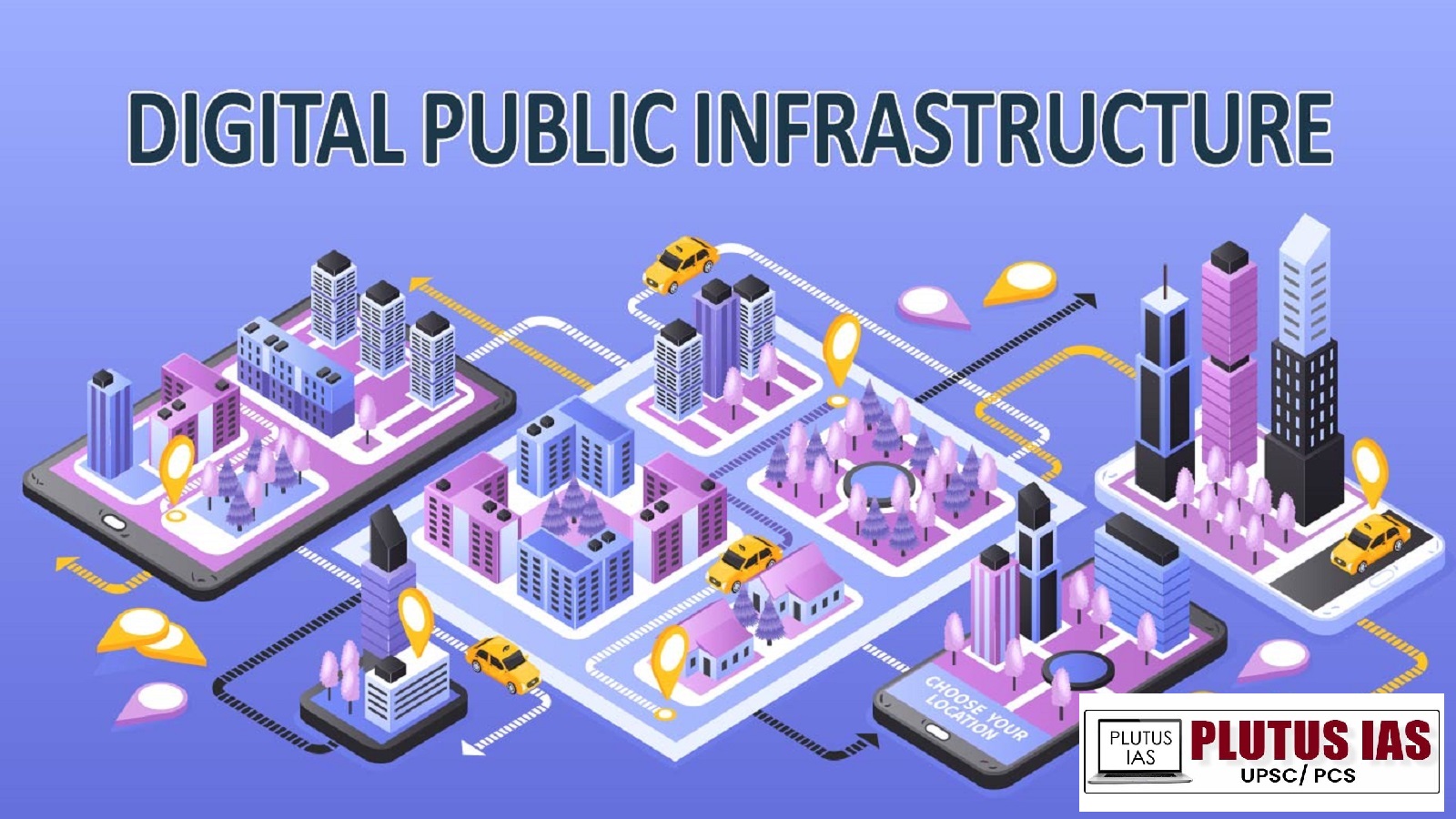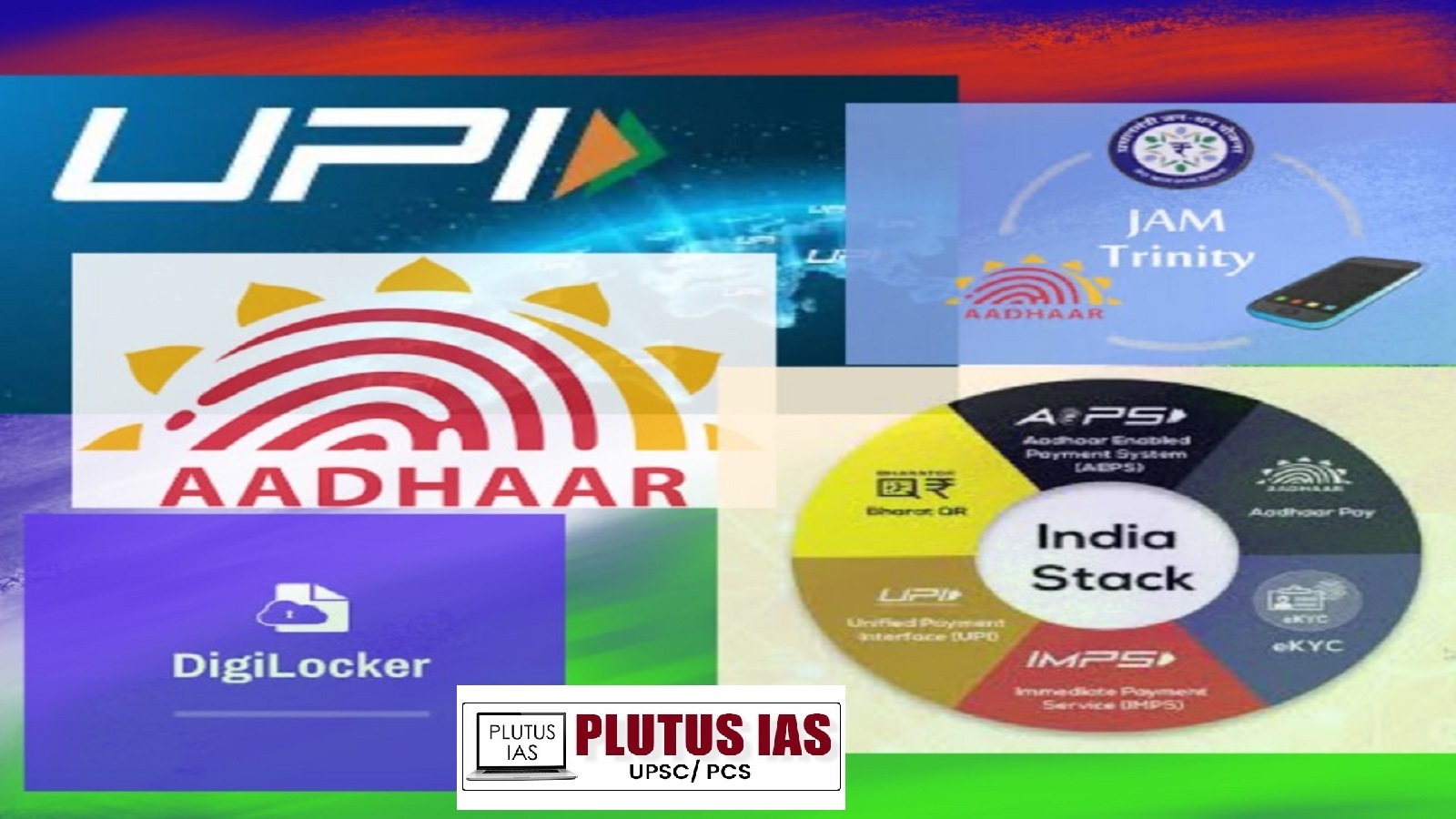17 Jul India’s role at the global level in digital public infrastructure
( This article is from the section ‘ Inclusive and Sustainable Growth, Digital Public Infrastructure ’ of General Studies Paper- 3 of UPSC Civil Services Mains Exam and ‘ Integration of DPI and AI, Financial Inclusion, G20 Presidency Agenda, Digital Technology and Digital Economy, Digital India Programme ’ of UPSC Prelims Exam. It also includes suggestions from the PLUTUS IAS Team. This article is from the section ‘ India’s role at the global level in digital public infrastructure ’ of ‘ Daily Current Affairs ’ .)
Why in the News ?

- A recent report released by the G20 Task Force highlights India’s leadership role in the field of Digital Public Infrastructure (DPI) and urges India to actively expand its digital solutions in the Global South.
- The task force was set up in January 2023 to oversee India’s G20 presidency agenda on digital public infrastructure (DPI) and financial inclusion.
- Its main objective is to increase productivity through adoption of digital technology and support the digital economy policies of the government.
What is Digital Public Infrastructure (DPI) ?
- Digital Public Infrastructure (DPI) is an important concept that helps in enabling digital inclusion of different countries.
- It is defined as a set of shared digital systems, which must be secure and interoperable and can be built on open standards and specifications to provide equitable access to public and/or private services at a societal level.
Major components of Digital Public Infrastructure (DPI) :
- Technology : It consists of digital systems and applications (e.g. software code, building blocks, protocols, standards) that are interoperable.
- system of government : Governance builds public trust in DPI and helps in its adoption by users on a large scale. It includes rules of engagement, cross-cutting and domain-specific standards, methods and policies governing stakeholder activity.
- community : Active and inclusive participation of the community can enable value creation. It also involves private sector and civil society actors who can collaborate to promote innovation and value creation.
Basic DPI :
- Identification : This includes the ability for people and businesses to securely verify their identity. Additionally, it also includes complementary services of trust such as electronic signatures and verifiable credentials.
- Payment : It allows easy and quick transfer of money between people, businesses, and governments.
- Data Sharing : It facilitates seamless sharing of data with consent across public and private sectors with the help of safeguards for personal data protection as per the governance framework.
Key facts of this report :
- This report Underlines the need to establish a worldwide body, which can create a global standards organization framework for using the DPI ecosystem. Along with this, other important facts of this report are as follows –
- Multinational Presence : This would be an important step in ensuring the multinational presence of this body. This body can help facilitate global cooperation between different countries.
- Preparation of policies and strategies : This body will require expertise to formulate policies and implement strategies effectively.
- Integration of DPI and AI : Will help investigate the integration of artificial intelligence to enhance DPI capabilities with ethical use and data privacy protections.
- Innovation and Scalability : The report suggests using open-source software and AI models to boost innovation and scalability in DPI, making it more accessible to private actors.
- Security of user data : It is important to implement measures to protect user data to maintain trust in AI-enabled services.
- Transparency : Addressing biases in AI algorithms ensures fair treatment for all users, ensuring transparency in AI processes helps regain public trust in digital services.
India’s contribution to digital public infrastructure globally :

- Globalization of UPI : To establish Unified Payments Interface (UPI) globally, the Reserve Bank of India is actively working with foreign missions. So far, negotiations have taken place with more than 80 countries and partnerships have been established in more than 30 countries.
- Role of NPCI : The National Payments Corporation of India (NPCI) has been pushing for international acceptance of UPI, highlighting India’s commitment to digital finance globally.
Source – Indian Express and PIB.
Download plutus ias current affairs eng med 17th July 2024
Practice Questions for Preliminary Exam :
Q.1. The term Digital Public Infrastructure is used for which of the following areas? (UPSC-2020)
A. For the sector of health care and education infrastructure.
B. For the field of digital security infrastructure.
C. For the field of telecommunications and transport infrastructure.
D. For the area of food safety infrastructure in India.
Answer – B
Practice Questions for Main Exam :
Q.1. Discuss factually India’s role at the global level in digital public infrastructure by highlighting the key findings of India’s Digital Public Infrastructure Report. (Word limit – 250 marks – 15)
Qualified Preliminary and Main Examination ( Written ) and Shortlisted for Personality Test (INTERVIEW) three times Of UPSC CIVIL SERVICES EXAMINATION in the year of 2017, 2018 and 2020. Shortlisted for Personality Test (INTERVIEW) of 64th and 67th BPSC CIVIL SERVICES.
M. A M. Phil and Ph. D From (SLL & CS) JAWAHARLAL NEHRU UNIVERSITY, NEW DELHI.



No Comments